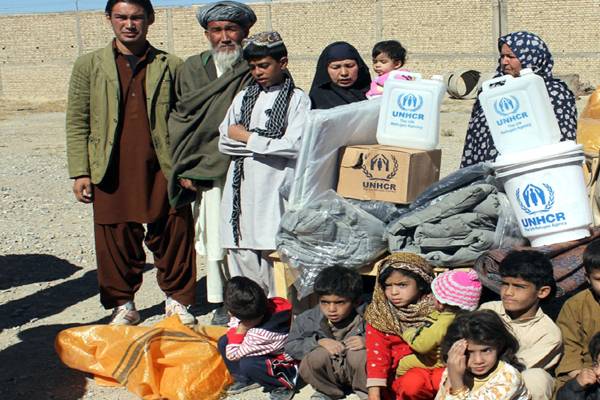With the wavering relations between Afghanistan and Pakistan, mostly due to factors outside their control, the day to day relations between these two neighbors are more often strained impacting on the lives of common people astride the Durand Line. The recent dip in relations due to deteriorating security situation in Afghanistan, for which it more often holds Pakistan responsible, has triggered a fresh wave of frustration and reaction within Pakistan's official and social circles. The same is clearly manifested in the tough stance adopted to accelerate the process of repatriating Afghan Refugees, whatever that it takes. These half cooked measures without due deliberations are not only counterproductive but are taking place at a great cost that will haunt us in years to come.
The international law prohibits forcible repatriation of refugees especially at a time when the local environment in the host country is not conducive for undertaking such an operation. The situation in Afghanistan, instead of improving, is fast deteriorating given the events of last few days in which scores of people have been killed and wounded. Besides the evolving climate in Afghanistan, policymakers in Pakistan need to review their actions in the light of the following factors. One, the goodwill of common Afghans earned over nearly 40 years of sacrifices must not be lost to our frustration with Afghan government, which besides lacking in capacity is under extreme domestic and external pressures. Our half-baked quick fix responses must not, by default, serve the interests of our enemies rather than Pakistan. Two, as a very important member of international community in this region, Pakistan cannot remain oblivious to international norms and its corresponding obligations related to refugees. While principally the refugees must be repatriated back to their country, Pakistan must closely work with international community, UNHCR and Afghan Government for creating favorable conditions leading to honorable repatriation. Three, the general perception of holding the Afghan refugees responsible for all our domestic ills is being too simplistic. Data of criminal record across the country does not support this sweeping assertion and may have much to do with our own society coupled with institutional limitations in arresting criminal activities. Four, a general perception that Afghan refugees are economically a drain on Pakistan also seems misplaced. There are scores of refugees engaged in productive activities ranging from agriculture to labor to hoteling to business activities associated with carpet industry, dry fruits, etc. Besides hundreds of Afghans patients visit our hospitals in Peshawar, Islamabad and elsewhere, almost daily, wishing to be treated here rather than India where treatment and traveling is not only cheap but where they are also received with open arms for political gains at Pakistan's cost.
Given the current environment, both in Afghanistan and Pakistan what should be Pakistan`s preferred course of action? First, Pakistan should vocally remain part of all regional and extra regional efforts aimed at creating positive climate in Afghanistan conducive for return of refugees. Second, forcible return is no option, hence must be abandoned in the mutual interests of the two people and countries. Third, instead of remaining at a tangent, Pakistan must align its policies with international law and larger international community. This way, besides projecting our soft image, Pakistan will be able to obtain the support of international stake holders in attracting the requisite financial assistance for quality refugee management. Four, Pakistan has been too poor in projecting and capitalizing on its sacrifices for earning the goodwill of Afghan people and international community. There is a requirement of concerted campaign in this regard to claim the much deserved goodwill for the sacrifices our people have made over almost 40 years in accommodating these refugees. Five, like every civilized country, Pakistan needs to seriously review its immigration policies. There have been two generation of Afghans born and grown in Pakistan. The government may undertake an exercise to consider award of citizenship to some in the larger interest of the country. Six, with the census planned in the near future, it should be in high priority with the government to register the remaining unregistered Afghans within the country besides documenting other illegal immigrants from other countries.
Fully cognizant of the negatively charged sentiments on both sides these days, suggesting to tackle the refugee crisis with more prudence may not be well taken. For remaining on a moral high ground, and on the right side of history, it must, however, receive our serious consideration. Regardless of our predicaments and challenges, only the right way of managing the repatriation process will positively impact Pakistan’s image in international comity besides defeating the enemies designs aimed at further expanding the wedge between the two brotherly countries.






